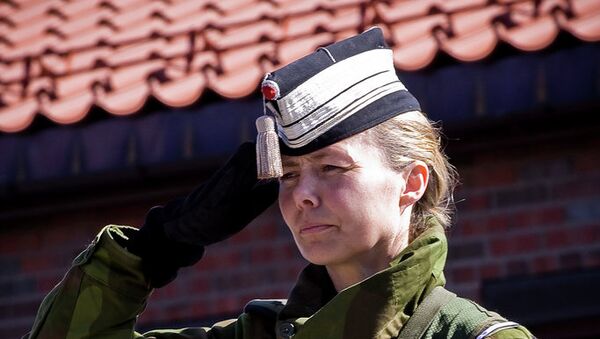MOSCOW, October 19 (RIA Novosti) – Norway’s decision to extend conscription to women will have a positive effect on the nation’s armed forces, Anita Schjølset, formerly of the Norwegian National Defense College, told Radio VR, as women have skills that are necessary to make the army more effective, especially in missions abroad where there is a great deal of gender inequality.
“Some people might say it is about political correctness and some may say it isn’t, and we are talking about operational effectiveness”, Ms. Schjølset says. The conscription of women, the expert believes, can solve a lot of cultural issues in dealing with local populations during foreign missions. “Given the fact that Norwegian forces are deployed to countries in which there is a great deal of gender inequality, that means dealing with conflicts which may have gender-related dimensions to them at times; we need an understanding that can be found among female soldiers and personnel, and they can get in touch with parts of the population”.
The new legislation follows the overall trend of Norwegian politics towards equality for all social groups. “Gender-neutral conscription has been discussed for quite a while in Norway and the legislation adopted in parliament this week is aimed at increasing the number of women in the Norwegian forces; this is based on two goals essentially”, Ms. Schjølset noted. “The first is to increase gender equality in the Norwegian forces, as Norway is focusing on maintaining equal rights and duties for men and women. Last year we celebrated the 100-year anniversary of women being granted the right to vote; men have the right to paternity leave and Norwegian public companies are required to reserve 40% of their workplaces for women. Actually, the Norwegian armed forces is one of the few places where formal inequality between men and women still exits. The second reason is operational effectiveness. In Afghanistan, our forces found out that women possess a better ability to handle conflicts, especially within societies where there is rampant gender inequality“.
Some people have expressed concerns that mandating military service for physically weaker women may be problematic. However, Ms. Schjølset says that introducing Norway’s social standards to the army will not result in the deterioration of the quality of the military forces. “We are not talking about putting unqualified people, women or men, on the battlefield”, she says. “We’re talking about recruiting and training people so that they would be able to do what’s needed on the battlefield…we’re recruiting qualified women, and we’re recruiting qualified men“.
Modern warfare has nothing in common with sports, where men and women are separated into two different leagues, the expert continues to explain. “Skills are needed that sometimes aren’t associated with physical strength, and with the Norwegian forces we have the idea that we need to recruit people that can provide a wide variety of skills, a lot of which women have to offer”, Ms. Schjølset says.
In the modern world, where compulsory conscription is progressively less common among the nations and violence is seen as not being the answer after all, expanding conscription may seem to be contributing to an obsolete institution of sorts. Not in Norway, though, as Ms. Schjølset notes that “public opinion polls show that there is wide support for the move, and this is what has been coming for some time”.
However, female conscription is not likely to be adopted elsewhere, the expert suggests. “I don’t think other European nations could adopt mandatory conscription for women. Regarding the impact of this Norwegian incentive on other European countries, I think time will show. It can bring attention to legal rights for women and the military and I would hope it will spark debates. As for today, even in Norway it is still a piece of paper that needs to be translated into practice and the impact of the move outside of Norway will depend on how this will go forward”, Ms. Schjølset says.
There are, of course, those in Norway who wish to abolish conscription, and the expert sees that as a realistic possibility. “Now in the Norwegian debate there are scholars that say that conscription may be removed altogether in the future, and that’s where the mandatory service of women will end”, Schjølset suggests.
As opposed to some other nations that practice conscription, in Norway the military is not seen as a last-ditch option for those who face daunting career prospects. “Norway is unique in the sense that the job market is still very good for both women and men, and so this is about recruiting motivated, qualified people, both women and men, and military service is not the only road to a career in Norway”, Schjølset says.
And while the positive consequences of extending Norwegian social standards to the nation’s military are plentiful, the inverse effect is somewhat unclear and worrisome. “We have studies that suggest that within a group, the minority will try to adjust to the majority, and the majority in the Norwegian armed forces are men. Many women may try to act and behave like men in order to be more incorporated into the community”, Ms. Schjølset concludes.
Norway became the first nation within NATO and in Europe to require women to serve in the military after the country’s parliament adopted the bill several days ago. Women have been allowed to volunteer for military service in Norway since 1976. Today women comprise a mere 13% of all Norwegian military personnel, which contradicts the nation’s initiative to promote social equality. Other nations that practice female conscription include Bolivia, Chad, Cuba, Eritrea, Israel, Libya, North Korea, Sudan and Tunisia.

